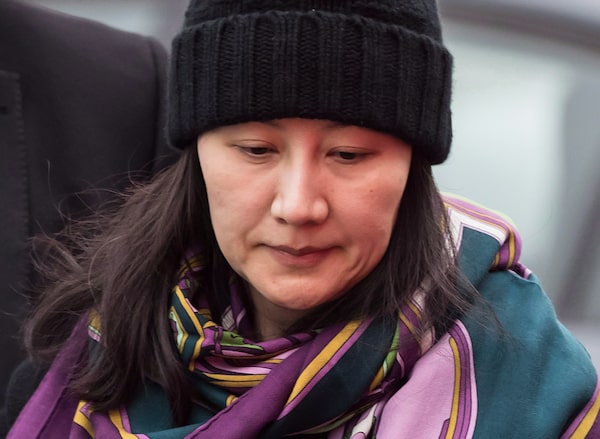
Huawei chief financial officer Meng Wanzhou is escorted by her private security detail while arriving at a parole office, in Vancouver, on Dec. 12, 2018.DARRYL DYCK/The Canadian Press
Huawei funds millions of dollars of academic research at North American and European universities to benefit its bottom line through wider advances in science and technology, not to capture the patents and intellectual property created by these studies, according to its chief financial officer Meng Wanzhou.
Ms. Meng, who has not spoken to media while on bail in Vancouver pending an extradition request to the United States, sent a column to the Nikkei Asian Review in Japan earlier this month. It came in response to the University of Oxford’s announcement that it “will not pursue new funding opportunities” to underwrite research or for donations from Huawei, citing “public concerns raised in recent months” related to the company’s partnerships in Britain.
In the piece – which Nikkei Asian Review said was taken from a previously unpublished speech Ms. Meng made at a conference in Singapore two months before her December arrest at Vancouver International Airport – she argues the security concerns surrounding her company are unfounded.
“Contrary to what some have alleged, Huawei is not after our partners’ patents or research results,” the op-ed published last Wednesday states. “Huawei supports universities so that scientific research can be a lighthouse that illuminates a path toward the future. Scientists own the lighthouse, allowing them to commercialize the fruits of their research however they like.”
Ms. Meng goes on to say that Huawei, which was founded by her father, will continue funding such basic theoretical research that leads to advances in science and technology, noting it has invested US$60-billion ($79.3-billion) in R&D over the past decade and plans to keep spending from US$15-billion to US$20-billion each year.
“Without basic research by universities, industrial development would lack theoretical foundations; without industry, knowledge would remain cloistered in the ivory towers of academia,” she writes.
After Oxford cut ties with the telecom giant, Canadian universities shrugged off the decision, saying the move and other recent developments have not changed their relationships with the company.
Such security concerns have dogged Canadian universities since a Globe and Mail investigation last May revealed Huawei had established relationships with leading research-intensive universities in Canada to create a pipeline of intellectual property the company is using to fortify its market position in next-generation, 5G wireless communications.
The company has committed about US$50-million to 13 universities and nearly 100 professors and their graduate students work on Huawei-funded projects, which have also qualified for millions of dollars in government grants. Many of the academics assigned all intellectual-property rights to Huawei. Canada’s Department of Global Affairs has routinely granted export permits to Huawei to transfer the research to China.
Canada and Britain are reviewing whether to follow their partners in the Five Eyes intelligence-sharing network – the United States, Australia and New Zealand – and ban or scale back use of Huawei’s equipment in domestic 5G networks. Japan’s largest carriers and the Taiwanese government have also said they will not use Huawei’s 5G technology, and the Czech Republic, Norway and Germany are reported to be considering doing the same.
 Mike Hager
Mike Hager